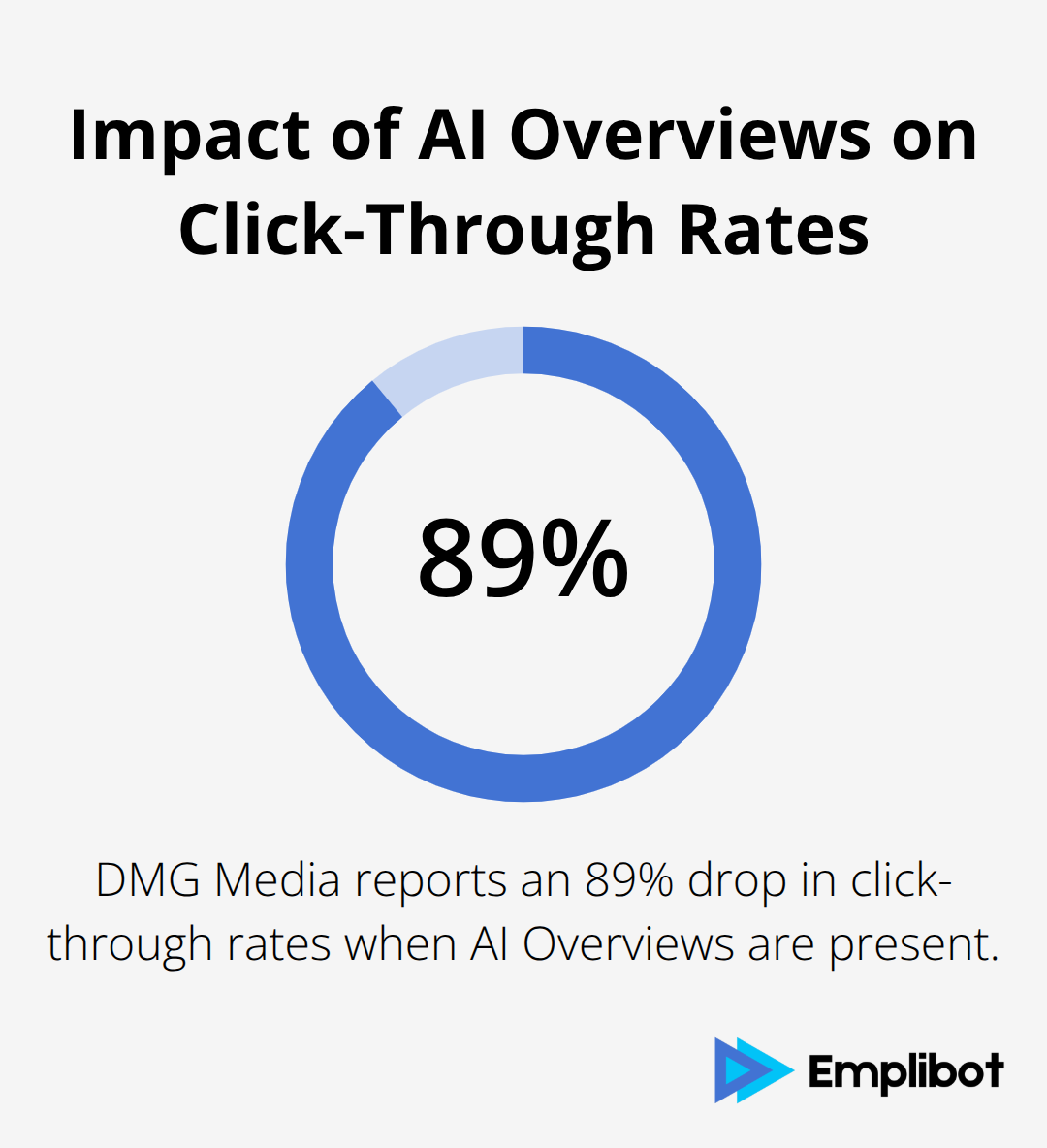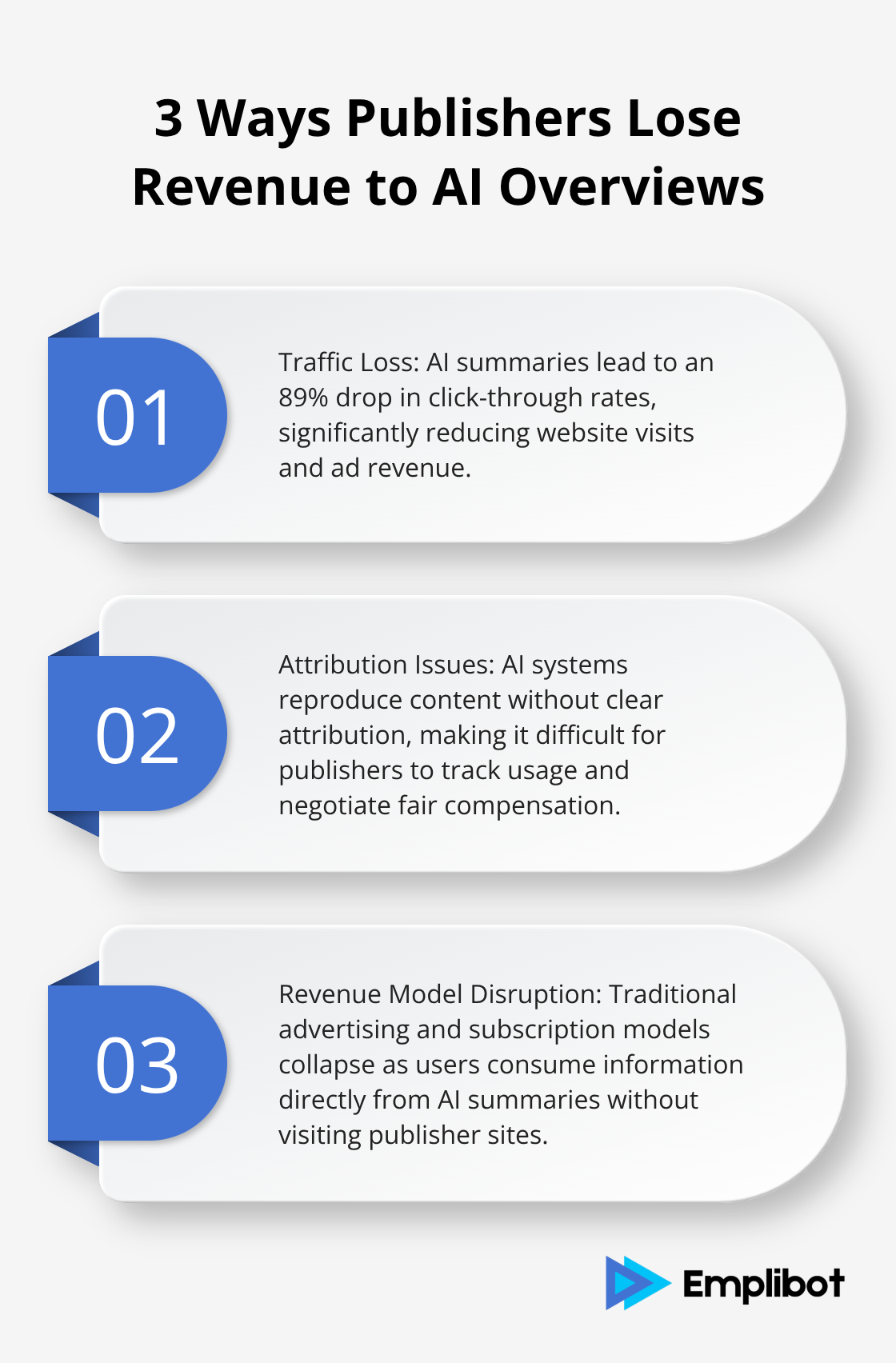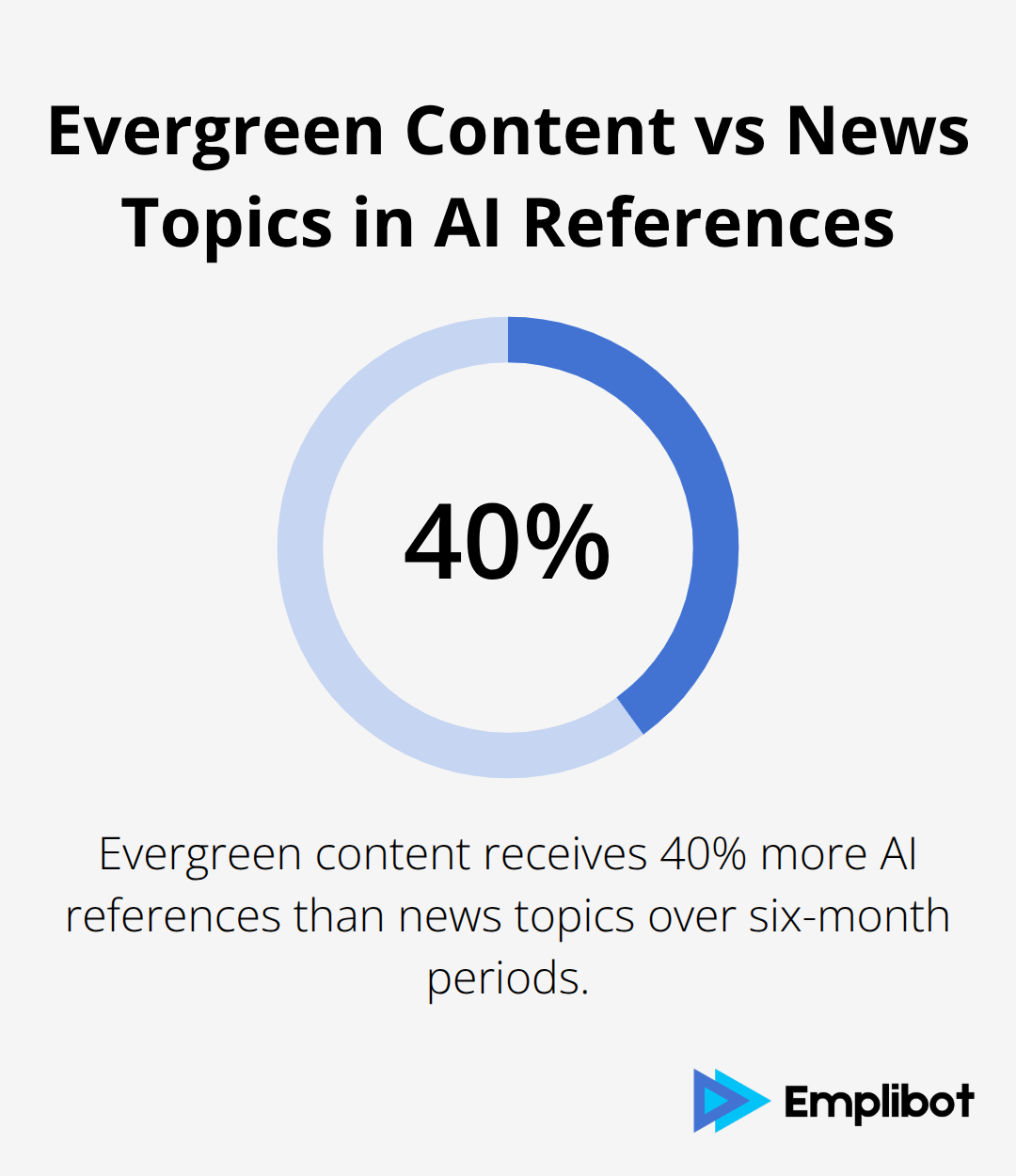Penske Media Corporation filed a major publisher lawsuit against Google AI Overviews in December 2024, claiming the feature diverts traffic from news sites while using their journalism without permission.
The case highlights growing tensions between publishers and search engines over AI-generated content summaries. We at Emplibot see this as a turning point that will reshape how brands approach search visibility and content strategy in the age of answer engines.
What Are the Legal Details Behind Penske’s Google Lawsuit
Penske Media Corporation filed the lawsuit in the United States District Court for the Southern District of New York on September 13, 2024, targeting Google’s AI Overviews feature that appears in approximately 20% of searches related to Penske’s content. The media giant (which owns Rolling Stone, Billboard, and Variety) argues that Google’s AI summaries constitute copyright infringement through reproduction of substantial portions of their journalism without authorization or compensation. Penske reports affiliate revenue dropped by over a third from peak levels, directly correlating with the introduction of AI Overviews that provide users with information without requiring clicks to original sources.
Google’s Defense Strategy Centers on Fair Use Claims
Google maintains its AI Overviews fall under fair use protections and actually drive traffic to publishers, with the company claiming its search features send billions of clicks to websites annually. The tech giant argues that AI summaries help users find relevant information faster while still directing them to original sources through embedded links. However, data from DMG Media shows click-through rates plummeted by 89% when AI Overviews appear, contradicting Google’s traffic benefit claims. Google spokesperson stated the company will vigorously defend against what it calls meritless claims, emphasizing that AI Overviews create new opportunities for content discovery rather than replace traditional search results.

The Broader Industry Context Shows Publisher Frustration
This lawsuit represents the first major U.S. publisher challenge against Google’s AI features, but Penske isn’t alone in experiencing traffic declines. The News/Media Alliance supports the legal action and argues Google’s near-90% search market share prevents fair negotiations that smaller AI companies offer through licensing deals. Industry observers note that while competitors like OpenAI actively negotiate content licensing agreements with publishers, Google has been slower to establish similar partnerships, creating tension over unauthorized content use in AI training and output generation.
This legal precedent will likely influence how brand publishers must adapt their content strategies to maintain visibility in an AI-dominated search landscape.
How Publishers Are Losing Revenue to AI Overviews
Brand publishers face immediate financial consequences from Google’s AI Overviews, with concrete data that shows devastating traffic losses. DMG Media documented an 89% drop in click-through rates when AI summaries appear, while Penske Media reports affiliate revenue that declined by over a third from peak levels. David Higgerson from Reach media group states that publishers receive no compensation for content that powers Google’s AI responses, which creates an unsustainable economic model where tech giants profit from journalism without payment to creators.
Traffic Patterns Shift Away From Publisher Sites
Search behavior has fundamentally changed as users increasingly consume information directly from AI summaries rather than visit original sources. Publishers report that even when their content appears in AI summaries, users rarely click through to read full articles, which destroys the traditional advertising-based revenue model that depends on page views and engagement metrics.
Attribution Problems Create Legal and Business Risks
Google’s AI system reproduces substantial portions of publisher content without clear attribution or proper licensing agreements, which raises copyright infringement concerns beyond Penske’s lawsuit. Publishers struggle to track when their content appears in AI responses, which makes it impossible to measure the true impact or negotiate fair compensation. This lack of transparency prevents publishers from optimization of their content strategy or understanding which articles generate AI citations.
Revenue Models Face Fundamental Disruption
The traditional publisher revenue model collapses when AI summaries provide complete answers without site visits. Publishers who built businesses around display advertising, affiliate marketing, and subscription conversions now watch their traffic evaporate while Google monetizes their content through search ads. Industry data shows that publishers lose an average of 60-70% of their search traffic when AI Overviews appear for their target keywords, which forces them to reconsider their entire content strategy and revenue approach.

These revenue challenges force brand publishers to develop new strategies that work within the AI-dominated search landscape.
How Can Publishers Fight Back Against AI Traffic Losses
Publishers must shift from reactive panic to proactive strategy and create content that AI systems cannot ignore or misrepresent. The key lies in content that contains original research, exclusive data points, and comprehensive source attribution. AI systems have no choice but to cite your work properly when your content demonstrates this level of rigor. Publishers who create content with embedded links to authoritative sources can benefit from AI Overview features that utilize generative AI to provide concise answers at the top of search results. This strategy works because AI systems prioritize content that demonstrates journalistic rigor through extensive source verification.
Build Authority Through Data-Dense Content Architecture
Transform your brand pages into citation magnets and structure content around hard numbers and verifiable claims rather than opinion pieces. Publishers report that articles with statistics from named sources appear in AI overviews more frequently than general content. Create dedicated resource pages that compile industry statistics, trend data, and research findings with proper attribution to original studies. Track which content formats generate AI citations and monitor tools like SEMrush or Ahrefs for featured snippet performance, then replicate successful structures across your content library.
Monitor AI Citation Performance Like Search Rankings
Establish systematic tracking of when your content appears in AI overviews and set up Google Search Console alerts for branded queries while you monitor competitor mention patterns. Publishers who track AI citation frequency discover that evergreen content clusters outperform trending topics in long-term AI reference rates, making them more valuable for sustained visibility. Focus your content strategy on comprehensive topic clusters around your expertise areas rather than chase viral news stories that AI systems quickly replace with newer information.
Create Quote-Ready Content That AI Systems Must Reference
Structure your articles with clear, standalone statements that AI systems can extract without context loss. Publishers who format key insights as quotable soundbites with supporting data see higher inclusion rates in AI summaries. Write topic sentences that work as complete thoughts and include the source attribution within the same paragraph. This approach forces AI systems to maintain your brand connection when they reference your insights.
Final Thoughts
The Publisher Lawsuit Against Google AI Overviews exposes a dangerous trap that brand publishers must avoid. Publishers who rely heavily on Google’s Top Stories features create vulnerability when algorithm changes or legal challenges disrupt traffic flow. Publishers who built their entire strategy around news visibility now face existential threats as AI summaries replace click-through behavior.
Smart publishers diversify through evergreen content clusters that maintain long-term value regardless of AI developments. These comprehensive topic hubs generate consistent citations across multiple AI systems and search engines, which reduces dependence on any single traffic source. Research shows evergreen content receives 40% more AI references than news topics over six-month periods.

Content automation becomes essential for publishers who want to maintain the publication frequency needed to compete in AI-dominated search results. We at Emplibot help publishers scale their content production through automated WordPress publishing that handles keyword research, content creation, and SEO optimization while distributing across social platforms. This systematic approach increases your chances of AI citation through consistent, high-quality output that search engines recognize as authoritative.

